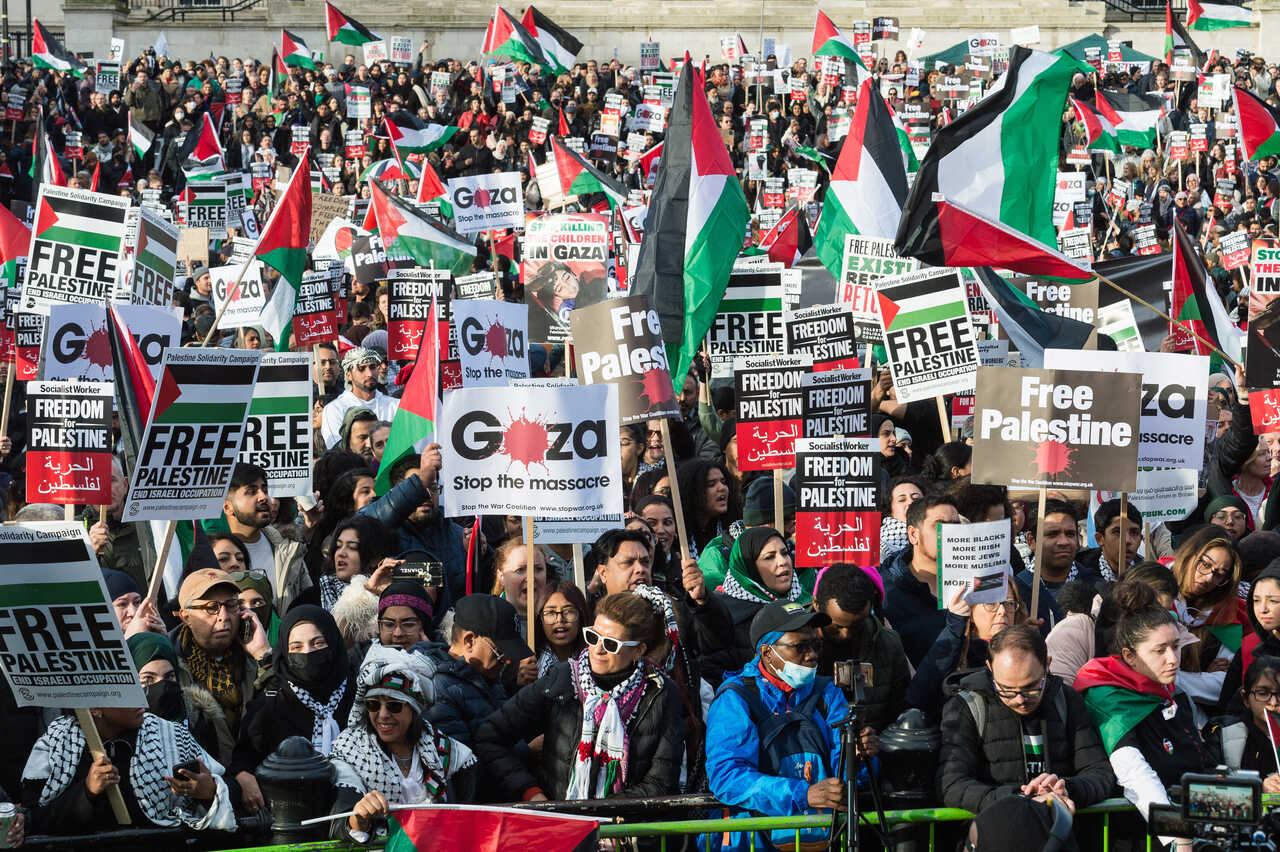Britain Conflicted over the Escalation between Hamas and Israel
In response to the Hamas attack of 7 October, the British government declared support for Israel while emphasising the right of the Palestinians to their own state (two-state solution) and the need for Israel to respect international humanitarian law. The government also sent additional military units to UK bases in the region to protect British citizens and interests. At the same time, pro-Palestinian demonstrations have been taking place all over the UK and Israeli and Palestinian supporters have been clashing in media appearances. A year before a general election in the UK, the Palestinian-Israeli conflict is both intensifying and linking the debate on foreign policy with immigration and internal security.
 AA/ABACA / Abaca Press / Forum
AA/ABACA / Abaca Press / Forum
The Middle East in British Politics
The 2021 Integrated Review of security, defence, development, and foreign policy and its update from this June consider the region vital to the “security and prosperity” of the UK. Britain’s closest partners in the Middle East include Jordan, Oman, Saudi Arabia, and Israel. Since 2016, Britain has been rebuilding its military presence in the region thanks to permanent bases in Bahrain and Oman, as well as to troop training agreements (including with Jordan). The British armed forces also took part in combating ISIS structures in Iraq and Syria. On the one hand, the region is the main source of British hydrocarbon imports, a major source of incoming foreign direct investment (FDI), and, in the case of Israel, of technological cooperation. On the other hand, Middle Eastern countries are the leading importers of British weaponry (especially Saudi Arabia) and FDI (e.g., in oil and gas extraction, petrochemicals, and renewable energy). The UK systematically supports Arab-Israeli cooperation initiatives (such as the Abraham Accords) and opposes the expansion of Iran’s influence in the region.
The Situation of British Citizens Abroad and Reaction of the UK Authorities
The 7 October attacks came when there were about 1,000 British passport holders in Israel and the Gaza Strip. At least a dozen Britons were killed and a similar number kidnapped by Hamas in the attacks. In response, Prime Minister Rishi Sunak condemned the attacks and emphasised Israel’s right to self-defence. At the same time, he noted that Israel should take steps to protect the civilian population in Gaza. The UK government also stated, echoing the U.S. position, that “humanitarian breaks” in the fighting would be needed to provide aid and the release of hostages. The Labour Party’s Keir Starmer took a similar position as the leader of the Official Opposition. Sunak and his foreign secretaries—at first, James Cleverly and then, from 13 November, David Cameron—also held many meetings with the leaders of Middle Eastern countries to discuss the conflict, as well as the rules of supplying aid to the Gaza Strip, of de-escalation and of the hostages’ release. Britain also doubled the amount of its humanitarian aid for the Occupied Palestinian Territories to be distributed by UN agencies in 2023 (i.e., bypassing Hamas structures) to £57 million. It was also announced that Hamas leaders and financiers would be added to the personal sanctions list.
At the same time, the government sent additional military units to the Eastern Mediterranean Sea and the Middle East. They will be operating from bases in the Persian Gulf and in Cyprus. They include the frigate HMS Duncan, RFA Lyme Bay and Argus landing ships with a company of Royal Marines, and P8 Poseidon reconnaissance planes. These units are intended to support the release of hostages, conduct reconnaissance, and support the prevention of regional escalation.
The UK government has also appealed to British citizens in Israel, the Occupied Palestinian Territories, and Lebanon to register with British diplomatic missions and then leave those areas. Between 12 and 19 October, civilian evacuation flights were organised from Israel, assisting about 500 British citizens. The government also deployed a rapid support team to expedite border controls for its citizens. According to the BBC, by 8 November, more than 150 of the 200 Britons staying in the Gaza Strip had left for Egypt through the Rafah crossing.
The Impact of the Escalation on Domestic Politics
The United Kingdom is home to the largest Jewish diaspora (300,000 people) in Europe next to France , as well as numerous Palestinian, Arab and Muslim minorities (20,000, 350,000, and 4 million people, respectively). There are also public disputes taking place in the UK, including about the legacy of the British Empire, immigration policy and multiculturalism, and the threats of radicalisation and terrorism. At the social level, the conflict is demonstrated by the mass pro-Palestinian left-wing marches in demand of an immediate ceasefire. They have been taking place since the beginning of the Israeli counterattack. The anti-Israeli and antisemitic slogans used during these marches directly fuel the British media debate on the loss of social cohesion and challenges to security from radicalised people and movements. This situation affects the positioning of political parties in the “long campaign” before the upcoming general election (to take place most likely in November 2024).
The ruling Conservatives have traditionally held moderately pro-Israel positions, yet with support for the Palestinians’ right to their own state. On the other hand, attempts to limit immigration (both illegal and legal), especially from the Middle East, and the related debate about the failures to integrate immigrants constitute important questions in the Tory policy debate. In response to the mass pro-Palestinian marches, the competition between the left-wing and the traditional establishment of the party, represented by Sunak, and the sovereignty, anti-immigration, and pro-Brexit right-wing of the party, represented by Suella Braverman (until 13 November, the Home Secretary), intensified. Her accusations that the police took insufficiently decisive actions against pro-Palestinian demonstrators developed into an open dispute with Sunak over the model of immigration policy, which ultimately led to her dismissal.
The fighting in Gaza resonates even more strongly within the Labour Party, the favourite in the upcoming general election. On the one hand, Starmer is pushing a political line similar to the government’s one on the fighting in the Gaza Strip. This is due to, among others, the need to distance the party from accusations of systemic antisemitism regularly levelled against it during Jeremy Corbyn’s leadership (including by the Equality and Human Rights Commission) and to confirm he is taking his share of responsibility for British foreign and security policy. However, a significant number of the party’s cadres and voters contest Starmer’s decision (e.g., Corbyn, Mayor of London Sadiq Khan, leaders in Scotland Jim Mackechnie and Baroness Bryan, several members of the shadow cabinet). They represent a pro-Palestinian stance and define the conflict through the prism of accusing Israel of war crimes and/or continuing the policy of British colonialism. Disputes within the party have led, among others, to the resignation of eight members of the shadow cabinet (including Imran Hussain and Jess Phillips) and the resignations from the party of numerous local activists (including the loss of control over the Oxford city council). The culmination was the vote in the House of Commons on support for an immediate ceasefire in the Gaza Strip on 15 November, during which 56 Labour MPs (out of 198) voted for it in defiance of the party whip.
Conclusions and Perspectives
The conflict is the first test of the agency of “Global Britain” in defending its citizens and interests in Israel and its political goals in the region, including maintaining privileged relations with some of the Persian Gulf states. However, refraining from a more active role in ending the present conflict reflects the UK government’s awareness of its limited capabilities and resources. Any more serious British involvement in the Middle East would, in particular, negatively impact military aid to Ukraine.
Due to the electoral calendar, the situation in Israel primarily affects Britain’s domestic policy. The Palestinian issue has been radicalising the extended election campaign on many levels. Another challenge for the Labour leadership is the fact that ethnic minorities who support the Palestinian cause and traditionally vote for Labour may affect the result in about 40 constituencies. However, answering this challenge is made more complicated by the need to compete on two fronts simultaneously. On its right flank, Labour is fighting for moderately conservative and for Jewish voters, and on the left for pro-Palestinian voters. In the second case, Labour is competing with parties calling for an immediate ceasefire in the Gaza Strip, especially the Scottish National Party and Liberal Democrats. With the publication on 23 November of this year’s official immigration figures (which hit a record of 672,000), the Palestinian-Israeli conflict will keep fuelling the debate on social cohesion in the UK, and raising levels of political polarisation.





